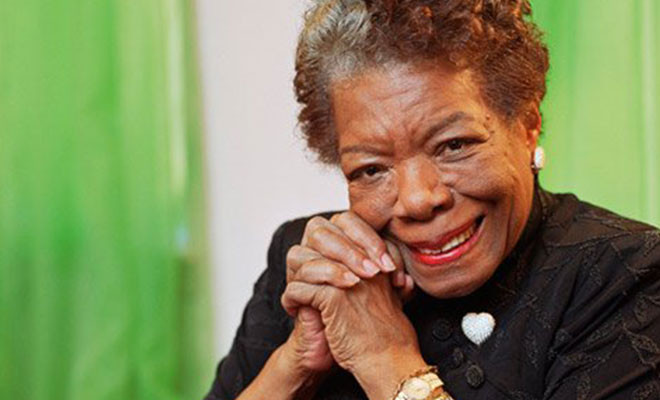
Why We Coach
Here is an excerpt from my book, The Seeker’s Guide, about the first time I met Dr. Maya Angelou, who died today. It comes in the middle of a chapter about balancing the masculine and the feminine, something Dr. Angelou did with tremendous power and grace. Rest in peace and glory, Dr. Angelou.
……Often it takes someone who has already made the journey to show us our own way. I looked around for models of women and men who were radical examples of the sacred marriage — people who were both powerful and loving, clear-headed and open-hearted — and could find very few. Those people who were even trying, struck me as heroic. They were not perfect; their lives were works in progress; but they were trying to move against the tide in the world and within themselves. They knew that as a culture, we had reached the end of the patriarchal road, and that for the sake of all human and non-human beings and the planet itself, they had to find a new way.
I had the good fortune of meeting and studying with several such people whose work is devoted to the sacred marriage: the Jungian analysts and authors Marion Woodman and Maureen Murdock; the poet Robert Bly; the feminist Carol Gilligan; the spiritual teachers Stephen and Ondrea Levine; and the poet Maya Angelou, were among the most influential models on my own journey. Meeting Maya Angelou was like being on the receiving end of a feminine thunderbolt. It was a turning point for me in my ability to speak what I knew to be true.
Maya Angelou’s books have been a part of me since I read I Know Why The Caged Bird Sings in high school. I heard her speak at a civil rights gathering when I was in college, and although she was just a spec on a faraway platform in front of the Washington monument, I was overwhelmed by her voice and her bearing. Even at a distance, Maya Angelou was larger than life. Years later, I watched her read her poem, “On the Pulse of the Morning,” on television, at President Bill Clinton’s inauguration. Once again, I was struck by her powerful voice, and her unusual ability to project that voice from a soft, round place in her body. Surrounded by the leaders of the nation, she, a poet and a black woman, was the authoritative voice of the day. Her imposing figure and her raw emotions elevated and dignified the inauguration ceremony.
Therefore, when she agreed to deliver the keynote address at a conference I was helping to organize in New York City, I looked forward to experiencing her powerful heart at close range. I was also nervous. On the first day of the conference — a cold New York City spring morning — I waited on the curb in Times Square, shivering in my little suit, for a limousine to deliver her to the hotel. The Broadway traffic was heavy and loud in the morning rush. Out of the stream of cars came a long limousine. It pulled up to the curb and the back door opened. I reached in to greet Maya Angelou and she grabbed my hand and shook it warmly. “Welcome, Maya,” I stammered.
She continued holding my hand and said in a firm, friendly, and round voice, “Won’t you please call me Miss Angelou?”
I was confused and a little put off. “OK,” I said, “Welcome, Miss Angelou.”
“Do you know why I’d prefer that?” she asked. “Well, did you ever wonder why we say, “Hello Miss Bernice,” “Hello sister Ruth,” when we greet our sisters and aunts in church? We must dignify our names because in many cases that is all we had.”
She went on in this way, grasping my hand, pulling me closer, into the limousine, telling me a truth that she felt a responsibility to proclaim. She sing-sang a list of names, closing her eyes, calling up the strong ancestral women of her heritage. Some didn’t have a last name, she said; only the surname of the slave master. Little white children called them Annie, called them Betsie. “That is why we call ourselves, Miss Anne, Miss Betsie.” She was educating me. It didn’t matter that we were on a Broadway curb or that she had a speech to deliver.
“I get it,” I said.
“Good,” she laughed, and got out of the limo. She was very tall, in a flowing dress and red high heels. Miss Angelou took my arm and we marched into the hotel lobby. Inside people walking by stopped in their tracks and came over to her: an African woman who had seen her years ago in Ghana and had never forgotten her; the elevator operator, familiar with her work; a business man rushing by with a briefcase, who just so happened to be carrying one of her books. She held each one’s hands and talked softy with the same kind of concentration that she had given me in the limousine. By the time we reached the 7th floor ballroom she had conversed with a string of admirers.
I sat with her backstage waiting for the cue for her to take the podium. All the while she was asking me about myself. What was the favorite thing I had done with my life, she wanted to know?
I’d never been asked that question, so I let the first thing that popped into my mind be the answer.
“Being a midwife, I guess.”
“Did it disturb your soul and call you to grow?”
“Oh, yes,” I answered.
“Tell me about it. Tell me about the smells and sounds.” She closed her eyes and hunkered down for a story. Right up to the time of the applause that called her to the stage, I told Miss Angelou about the smells and sounds of laboring women and newborn babies. I recalled the awful hour when I would inevitably be roused from sleep and called onto the empty road, and then into the family’s house, hovering with expectation in the blue-black night. The sweet concern of the father, the fierce demands of the mother, the slow descent of the baby against the bones and muscle of the woman’s insides. The miracle of birth was repeated once again: the surprising head, the slippery body, the braided cord, the first breath. I kept checking to see if Miss Angelou was really interested in this, my favorite thing. Her amazing face stayed fixed on my words. She was catching them. She was adding them to herself. She had given me a teaching and now she was receiving one back. When she finally was called to speak I was exhilarated and humbled, as if I had just completed a river trip through awesome and dangerous territory.
Miss Angelou went on to deliver a rousing speech. She put her whole body into her words. She was fierce and gentle, funny and deadly serious, outrageous and touching. She moved the crowd like no one else I had ever seen. But what struck me most was how she was purposefully moving people away from her words, into their own experience, and then out into the world. She was not using her power to focus on herself. Instead she was weaving a web of inclusiveness while at the same time teaching a lesson.
First published at elizabethlesser.org.







